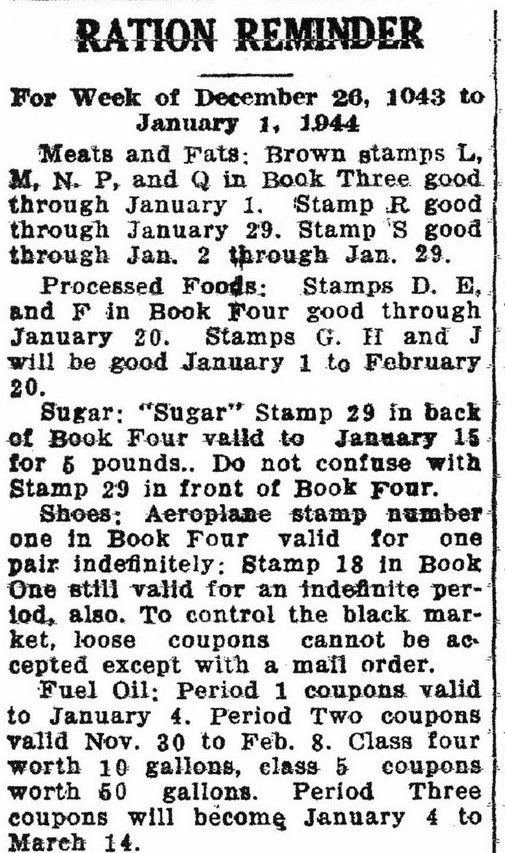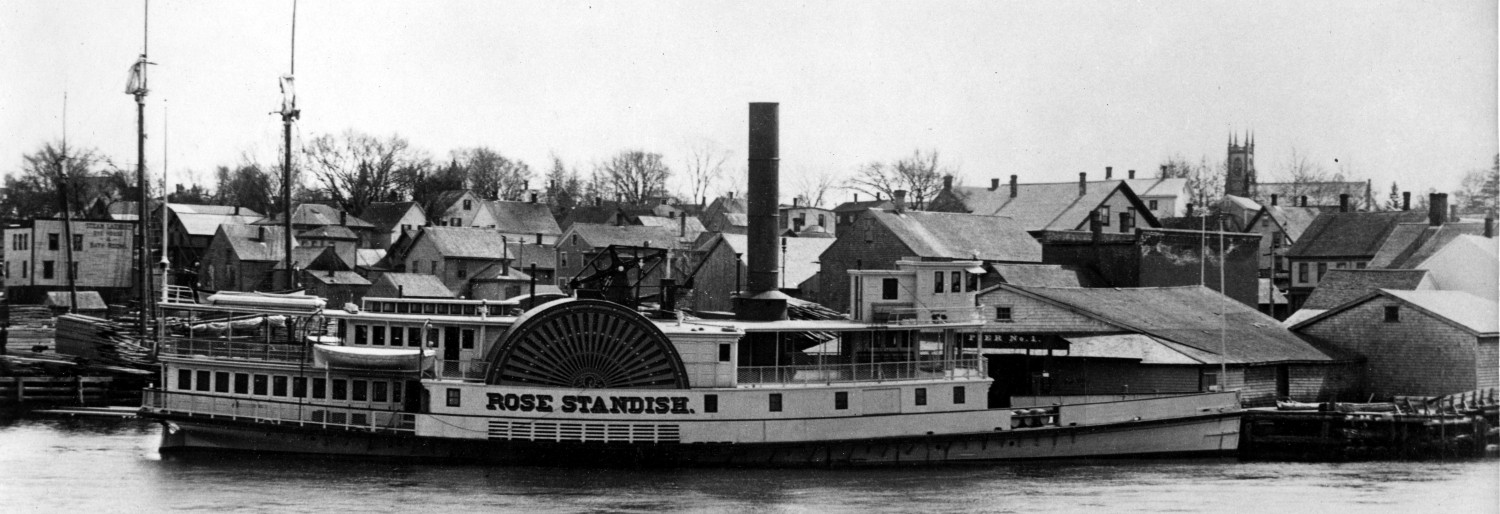
We mentioned in a recent article the confusion and hardship caused by rationing during WW2. There were articles in the local papers nearly every week describing the changes in the program. A few from the St Croix Courier are included below:
February 1943: St Croix Courier
Calais – Who Wants Prunes
Public schools were closed all day Monday and Tuesday while the teachers assisted in enrolling applicants for ration book no. 2. Under the new points system each individual is entitled to 48 points a month and the average large-size can of vegetable or fruit nicks you for 16 points. A large can of tomatoes will be sold for 24 points, half of your monthly ration. Two pounds of prunes or raisins can be obtained by surrendering 38 points, a few items including olives, pickles, jellies, meat stews, spaghetti, noodles, relishes, milk and others are not rationed.
December 1942 Courier Rationing
CALAIS
A Run On Gas Stations
When newscasters began reporting a drastic cut in gas sales last Thursday with the eventual cancellation of all A-coupons almost a certainty, there was a stampede to the gas stations by all the holders of A-books. By noon, when further sales were prohibited nearly everybody driving a car had a full tank. Monday’s announcement from Washington that A coupons were still good didn’t mean much to the most of us. We’ve used all our coupons for the period and one more cold spell like that of last week will put an end to our riding. It took a gallon of gas to warm the engine.
April 1943 Courier:
How Things Stand
Officially, it has been illegal for some two weeks past for any items rationed in the United States to be exported from Canada, but the enforcement of the regulation is left more or less up to the discretion of Canadian Customs officials who govern themselves locally by the state of local supplies from day to day. At times when meat is virtually unobtainable in Calais, for example, while the St. Stephen market is reasonably well supplied, exports within reason are permitted, while at other times the supply locally may not warrant such action. As a result of this control, border residents have been spared unnecessary hardship while wholesale exports of scarce commodities are made impossible.
August 1943: Courier
A real disaster
Twice within the last week the beer supply in Calais has run out. The drought was tough medicine for those citizens, and neighbors, who prefer that kind of beverage to the “hard” liquor purveyed in the state store. Shortages of all kinds of foods have been shrugged off with some humorous remark or other but there was nothing but long faces and expressions of dismay around the corners when the news of the beer disaster was circulated.
Most rationing ended with the Japanese surrender except for sugar which was rationed until 1947. In England, rationing continued for many goods until 1954.
Japanese surrender: St Croix Courier
August 16, 1945
News of Japan’s Surrender Brings out Happy Throngs
Announcement of the surrender of Japan, which came over the air at 7 o’clock Tuesday evening, August 14, touched off the most spontaneous celebration the border towns have seen since 1918. Noise-makers in the form of fireworks were lacking, but gaily celebrating crowds made up the lack by liberal use of automobile horns, whistles, bells and anything else that they could lay hands on, and the streets of St. Stephen and Calais were jammed all evening with happy crowds giving vent in gay yet orderly fashion to the pent-up emotions of nearly six years of war.
As previously planned, the official news at 7 o’clock was signaled by the blowing of whistles and ringing of bells, which continues intermittently for half to three-quarters of an hour. At 8 o’clock, also according to plans prepared in advance, a community service of thanksgiving was held in Kirk-McColl United Church. In the meantime, the streets had begun to fill with merry-making throngs and cars in unbroken streams moved through the main streets, their horns blending with noisemakers of all kinds in a sweet cacophony of rejoicing.
A number of car owners did a surprising amount of decorating in the short time at their disposal, and flags and bunting appeared as if by magic in the windows and on the storefronts of most places of business. The happy occupants of some cars sang the songs of victory and patriotic airs. A number of trucks were filled with young people waving flags, shouting and singing. One enterprising Calais car owner somewhere got a locomotive bell which he had mounted on a front fender with a cord to the front seat, and which rang majestically as the car moved along in the celebrating motorcade. Even the sirens of fire-fighting apparatus were used in the first half-hour to add to the din. The spontaneous, unorganized nature of the demonstration was its outstanding characteristic, along with the fact that everything was in good order. There was not the slightest evidence of vandalism or willful destruction of property, and very little sign of drinking.
